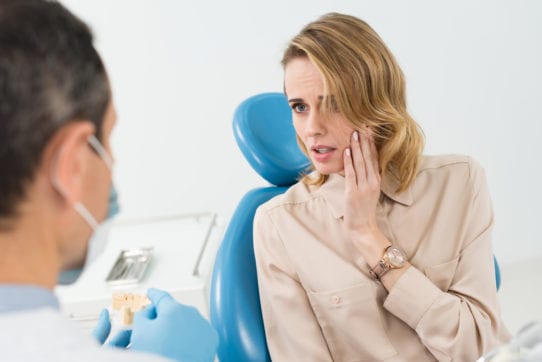 Are you in pain? When a toothache strikes, it can throw your life into a state of disarray. You don’t feel like eating, you can’t enjoy your usual routines, you can’t sleep—and you definitely can’t imagine suffering through another few days to wait for an appointment!
Are you in pain? When a toothache strikes, it can throw your life into a state of disarray. You don’t feel like eating, you can’t enjoy your usual routines, you can’t sleep—and you definitely can’t imagine suffering through another few days to wait for an appointment!
Waiting two or three days until an appointment may seem like a torturous eternity. That’s why we always try to find a place in our schedule for dental emergencies.
If you are experiencing intermittent or constant pain as the result of a dental problem, call Drs. Victoria Uryniak and Carson Ferris-Zeolla today and we’ll find a way to see you. When patients are in pain, we do everything in our power to help you find relief, so you can get back to your life.
Common Dental Emergencies
Some of the more common dental emergencies that bring patients to our door include:
- Cracked tooth
- Severe Toothache
- Knocked-out tooth
- Broken /dislodged crown or veneer
Depending on your symptoms, some of these may not be true emergencies, and can wait for a next-available appointment in a day or two. If you are in extreme pain, however, we always consider that an emergency. In other words, if your dental pain is preventing you from following your normal routines, we consider that urgent and will treat your condition as an emergency.
Is your pain stopping you from:
- Sleeping?
- Eating?
- Doing your job?
- Caring for your family?
If You Have a Knocked-Out Tooth
If your tooth has been knocked out during an accident or injury, first check to make sure you do not have any lacerations, contusions, or bleeding wounds that require medical attention. Always seek medical attention first in case you have damaged bones or other tissues that require urgent medical intervention.
If the knocked-out tooth is the only problem, call us to let us know you are coming and bring it to us as quickly as you can. It is sometimes possible to re-attach a tooth into its socket.
- Put the tooth in a small container of milk or saliva.
- Do not wash the tooth.
- Bite down on a soft clean cloth if you are bleeding from the site of the lost tooth.
If the tooth still has the connective tissues attached, it might be possible for one of our doctors to put in back in its place. Do not try to do this yourself. If the tooth does not take, we can help you replace the tooth with a dental bridge or dental implant.
If a baby tooth has been knocked out, do not try to replace it; make a regular office appointment. Baby teeth should not be put back in place because this may damage the adult teeth growing in the jaw. Depending on the age of the child and the location of the tooth, the child may need to have a bridge made for proper eating and speech development until an adult tooth is ready to replace it. Make a regular appointment if your child has lost a baby tooth prematurely.
Home Care for Dental Emergencies
If you have an appointment to be seen by a dentist, but are still suffering from a terrible toothache, there are a few things you can do to make yourself more comfortable while you wait. Take over-the-counter non-steroidal anti-inflammatory (NSAID) medications, such as ibuprofen (Advil) or acetaminophen (Tylenol). Do not exceed the recommended dosage on the package instructions, however.
Avoid eating foods that may irritate the toothache, and stick with foods that are soft and easy to swallow, such as purees, applesauce, oatmeal, and puddings. If you are used to having coffee or hot tea in the morning, you may want to skip it, since extreme temperatures can aggravate a toothache.
An ice-pack can be held against the cheek at the site of the pain, but do not apply ice directly to the tooth or inside the mouth.
If the pain is severe, you may want to visit a drug store for a “toothache kit.” These kits usually include eugenol (clove oil), which is a natural anesthetic and can reduce the pain of toothache. Apply a small amount of eugenol to a cotton bud and gently bite down on it with the affected tooth until you notice a difference.
Toothache with Facial Swelling
If you are suffering a painful toothache that did not start with a blow to the face, facial swelling can be a sign of dental abscess. This condition is extremely dangerous, and you should go to a hospital or emergency medical center, especially if you also have a fever.
When swelling (puffy cheeks), fever, and toothache are present, this means you have an infected tooth and the infection has spread to the gum tissue. This is an extremely dangerous situation, because it means the infection may spread to the blood stream or other parts of the body, such as vital organs. This situation has the potential to be fatal and will not get better on its own.
Call Walnut Pond!
If you are experiencing any type of dental emergency, call us and we will make time for you—even after-hours. In the meantime, we will listen to your symptoms and advise you of the best way to take care of yourself until you can be seen.






